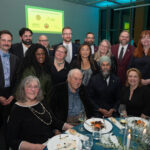
Le militantisme des travailleurs juifs est essentiel dans la lutte contre la discrimination au Canada
The Jewish community has been a big part of Canadian labour history, and has played a vital role in the fight for social justice and the defense workers’ rights. Incidents of antisemitism and hate are on the rise, and Canada’s unions remain resolute in fighting antisemitism, hate and discrimination.
“Jewish labour community activists recognized early on the interconnected nature of all struggles against discrimination, and the importance of coming together across communities to fight alongside one another to confront it. We must all follow this model as we continue to push back against the rising tide of antisemitism in Canada,” said Bea Bruske, President of the Canadian Labour Congress. “We stand in solidarity and support of Jewish workers and community members.”
In 1936, the Canadian arm of the Jewish Labour Committee (JLC) was founded, modelled on the American Jewish Labour Committee. The JLC represented trade unions with a significant Jewish membership, which included the Amalgamated Clothing Workers’ Union, the United Cap, Hat and Millinery Workers’ Union and the International Ladies’ Garment Workers Union.
The primary focus of Jewish community activists in Canada in the 1940s was aiding Holocaust survivors who had immigrated to Canada, and advocating for the admission of Jewish refugees arriving to Canada from Europe. In subsequent years, activists turned their efforts toward tackling systemic antisemitism in Canada as a whole, including in the workplace and the labour movement. In Canada at the time, Jewish people were shut out of many universities, places of employment and other institutions, including professional associations and banks.
In 1947, as part of the Committee’s efforts to address this discrimination, JLC National Director, Kalmen Kaplansky successfully lobbied to introduce an anti-discrimination motion at the Canadian Congress of Labour (CCL). The motion, which passed, called for strong action in “the fight for full equality for all peoples, regardless of race, colour, creed, or national origin.” The following year, as the JLC began to broaden the scope of its work, viewing the struggle against antisemitism as being connected to the larger struggle against hate and prejudice, Kaplansky established a permanent committee on racial tolerance.
In the 1950s, Jewish activists were part of the fight against anti-Black racism and discrimination in Dresden, Ontario, where many restaurants and businesses excluded Black residents from service. The Toronto Civil Liberties Association led a coalition of 35 human rights advocacy organizations, women’s groups, trade unions, and ethno-cultural groups, which included the Canadian Jewish Congress, in a fight to demand a non-discrimination requirement for local businesses applying for a license.
This Jewish Heritage Month, take some time to learn more about the history and work of the Jewish Labour Committee – click here.







